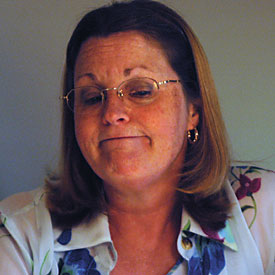 |
|
DAVE HARDEN/Arizona Daily Wildcat
|
Brook Sheldon, director of the School of Information resources and Library Sciences, expresses her happiness that SIRLS will be saved. The SIRLS program has been fighting elimination since January.
|
|
By Keren G. Raz
Arizona Daily Wildcat
Friday April 11, 2003
More than 40 percent of programs slated for termination saved
Seven programs originally targeted for elimination under Focused Excellence received yesterday the good news they had been hoping for from President Pete Likins and Provost George Davis.
Those programs, which include the School of Information Resources and Library Sciences, landscape architecture, planning and the Flandrau Science Center, learned they will not be cut.
The humanities program, which is separate from the College of Humanities, as well as the medical technology program, are among the 9 departments that still face elimination.
The update comes almost four months after the first proposals for elimination were released in mid-January.
 |
|
It's been a very tough ordeal for faculty and staff
-Brook Sheldon,
director, School of Information and Library Resources
|
 |
In their rationale for keeping the programs, Likins and Davis rarely mentioned financial reasons, but more often referred to the academic value of the programs, many of which fill community needs.
That was the argument made by supporters of several of the saved departments, including SIRLS, landscape architecture and planning.
SIRLS, the only school of its kind in the Rocky Mountain region, serves an especially important role at UA, said Edward Donnerstein, dean of the College of Social and Behavioral Sciences.
When state librarian Gladys Ann Wells heard the good news, her first response was, "Yahoo!"
"It's such an important program because we have so few library schools west of the Mississippi, she said.
"It's a program that works with the state library to benefit the rest of the state."
Wells has played an important role in the campaign to save SIRLS that began immediately after the proposal for elimination was first announced.
With the agreement of other librarians from around the state, she has committed $50,000 each year for SIRLS's Knowledge River program, which focuses on the needs of minority groups.
 |
|
DAVE HARDEN/Arizona Daily Wildcat
|
Senior program coordinator Debra Ludden is one of many UA employees who will lose their current positions because of Focused Excellence cuts. The department found out yesterday that their program will be eliminated.
|
|
She has also pledged money to hire an assistant professor for two years, said Brook Sheldon, director of the school.
And that money only represents a small part of the fundraising campaign that has gone on to save the library school.
Lisa Bunker, a SIRLS alumna, stood at the entrance of the school, her arms piled high with paper and ready for an afternoon nap after staying up late organizing a SIRLS benefit dinner.
Already SIRLS has raised over $15,000 from the dinner alone, she said.
With the momentum from this fundraising effort, SIRLS is in an even better position for the future, Donnerstein said.
"This opportunity is a way to make them stronger by taking a different, alternative model · so when times get bad, they have revenue sources coming in," he said.
Sheldon has also proposed implementing program fees of $100 per credit hour for in-state students and $400 per credit hour for out of state students in order to generate revenue for the school.
Administrators have asked SIRLS to study whether extra fees would hurt the program's enrollment, but Donnerstein said he's confident that the school would benefit from a fee, because of the added revenue.
Just a few hours after officially finding out that her program had been saved, Sheldon relaxed in her chair, confident that her efforts to save SIRLS have put her school in a better position for the future.
"It's been a very tough ordeal for faculty and staff, but in the long run, some really important opportunities have opened up in terms of support from our constituencies," she said.
Barbara Becker, the School of Planning director, was also optimistic yesterday about the future of her program, which administrators plan to move into the College of Public Health.
"We know we can make it," she said.
Although administrators suggested that they might eliminate some non-tenured planning faculty positions, Becker said she has a fund-raising campaign underway to help save those positions.
"There's no intention of leaving the faculty behind," she said.
But not all employees will be so lucky.
Early yesterday afternoon Debra Ludden, senior program coordinator for the humanities program, found out that not only would she lose her program, but she would also lose her job.
As part of the proposal to eliminate the humanities program, administrators said they would not renew the contracts for the senior program coordinator and the adjunct faculty members.
Tears came to Ludden's eyes as she talked about her disappointment and frustration with yesterday's proposals.
"They're putting out a financial bulletin and saying I'm being dismissed, but that's not the case, I'm being let go," she said.
"I don't appreciate the word Īdismissed' when I don't have the option of saving the program."
While Richard Poss, director of the humanities program, had hoped administrators would take his program off the list for elimination, he said he understands why they didn't.
In the proposals for elimination released in January, administrators said they were considering the elimination of the humanities program because it did not operate as a normal academic department.
Poss said he will now focus on helping humanities faculty find homes in other departments.
"What I'm doing is helping to shepherd (the faculty) in an arrangement with a department to help them continue to make the contributions to the university that they have made in the past," he said.
Jeff Sklar contributed to this report.

